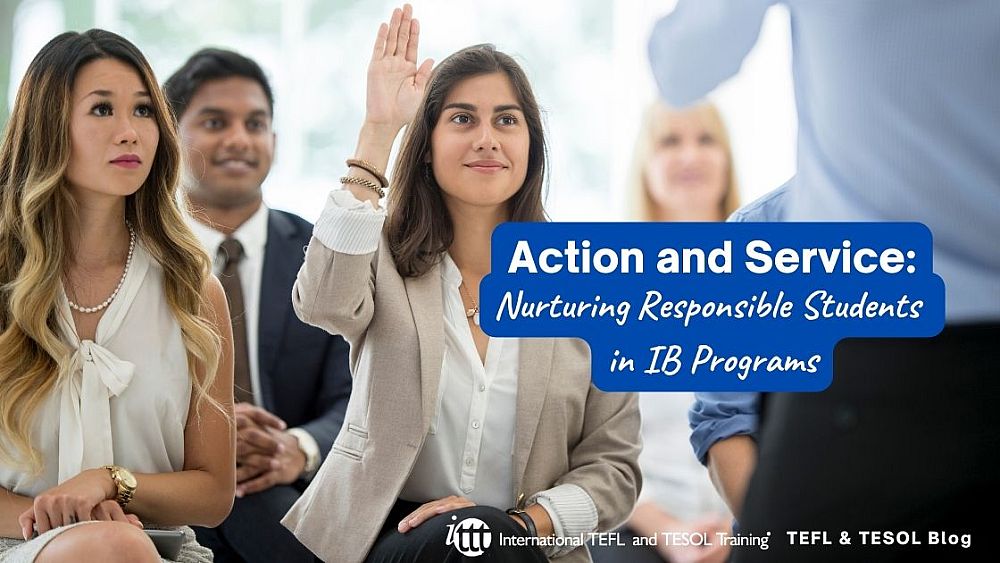Action and Service: Nurturing Responsible Students in IB Programs

The International Baccalaureate (IB) programs, including the Primary Years Programme (PYP) and the Middle Years Programme (MYP), aim to develop students who are active, compassionate, and engaged in their communities. Both the PYP and the MYP emphasize the importance of action and service as integral components of a holistic education. While the PYP focuses on "Action," and the MYP emphasizes "Service and Action," there are several commonalities between these two concepts. This article will explore the similarities and connections between Action in the PYP and Service and Action in the MYP, highlighting their shared principles, outcomes, and benefits for student development.
Table of Contents
Student Engagement and Collaboration
Benefits for Student Development
Are you ready to teach English as a foreign language?
Check out what our course grads say in our many video testimonials!
Shared Principles
Action in the PYP and Service and Action in the MYP are grounded in common principles. Both concepts aim to inspire students to make a positive impact on their communities and the wider world. They encourage students to develop empathy, respect for diversity, and a sense of responsibility towards others. Both Action and Service and Action promote active engagement, encouraging students to go beyond the classroom and apply their learning in real-life contexts. By focusing on action and service, both programs nurture the development of well-rounded individuals who are socially responsible and actively contribute to society.
Outcomes and Objectives
In terms of outcomes and objectives, Action in the PYP and Service and Action in the MYP share many similarities. Both aim to develop students' understanding of global issues and their ability to take informed action. They foster students' skills in critical thinking, problem-solving, communication, and collaboration. Furthermore, both concepts encourage students to reflect on their experiences, promoting self-awareness and personal growth. By engaging in action and service, students in both programs have the opportunity to develop a sense of agency, become advocates for change, and contribute to the betterment of their communities.
Types of Action
Action in the PYP and Service and Action in the MYP encompass various forms of action and service. In the PYP, action is classified into three categories: "action for self," "action for others," and "action for the environment." Similarly, the MYP's Service and Action component includes community service, service learning, and advocacy. Both programs emphasize the importance of engaging with different types of action to address a range of local and global issues. Whether it is organizing fundraising events, participating in community service projects, or raising awareness about social justice issues, students in both programs have the opportunity to apply their learning to effect positive change.
Student Engagement and Collaboration
Both Action in the PYP and Service and Action in the MYP emphasize the significance of student engagement and collaboration. Students are encouraged to work together, pooling their skills, knowledge, and resources to maximize their impact. Through group projects, service initiatives, and collaborative action, students in both programs develop essential interpersonal skills and a sense of collective responsibility. The emphasis on teamwork and collaboration fosters a sense of community and supports the development of leadership and communication skills, preparing students to become active participants in an interconnected world.
Benefits for Student Development
Engagement in Action in the PYP and Service and Action in the MYP brings about numerous benefits for student development. Both concepts contribute to the holistic growth of students, nurturing their social-emotional, cognitive, and ethical development. By engaging in action and service, students develop empathy, compassion, and a sense of responsibility towards others. They gain a deeper understanding of global issues, fostering their ability to think critically and analyze complex problems. Furthermore, engagement in action and service enhances students' self-confidence, resilience, and leadership skills, empowering them to make a positive difference in their communities and beyond.
Conclusion
Action in the PYP and Service and Action in the MYP share common principles, outcomes, and benefits for student development. Both concepts aim to foster socially responsible individuals who are actively engaged in making a positive impact on the world around them. Through engagement in various forms of action and service, students develop essential skills, values, and a sense of agency. The similarities between Action in the PYP and Service and Action in the MYP underscore the coherence and continuity of the IB programs in nurturing globally-minded individuals who are committed to creating a better future.
Are you ready to teach English as a foreign language?
Apply now & get certified to teach english abroad!
Speak with an ITTT advisor today to put together your personal plan for teaching English abroad!
Send us an email or call us toll-free at 1-800-490-0531 to speak with an ITTT advisor today.
Related Articles:
- Top 10 Cities in Europe with the Highest Demand for English Language Teachers
- 5 Reasons To Take A TEFL Course Right Now - Even If You Are Not Leaving Yet | ITTT | TEFL Blog
- All the Documents You Will Need to Teach English Abroad
- The Impact of Positive Motivation on an ESL Classroom
- You're Never Too Old to Change Your Life and Do a TEFL Course | ITTT | TEFL Blog
- Getting Student Placement Right - The Best Desk Arrangements for EFL Students



